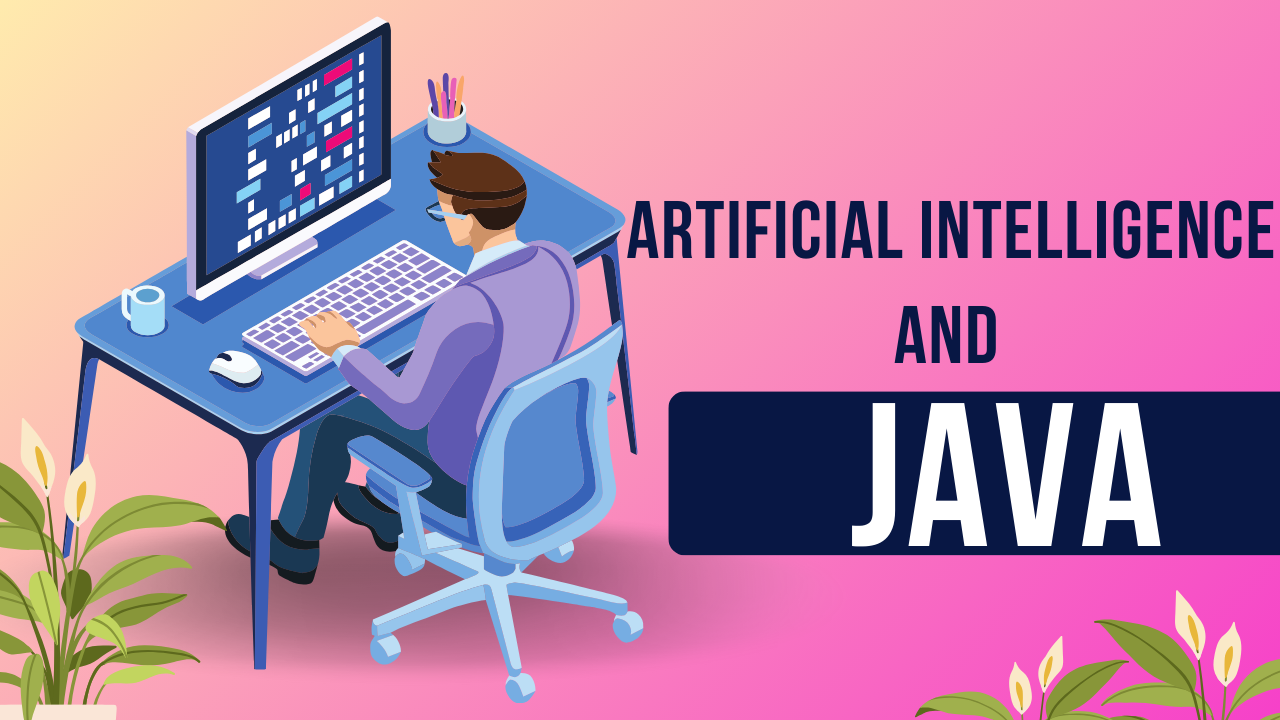Introduction
Artificial Intelligence (AI) has quickly become an essential element of modern technology, disrupting industries and revolutionizing how we interact with digital assets. Of the numerous programming languages employed to build AI solutions, Java stands out for its robustness, scalability, and versatility. Characteristics highlighted here by this article which explores their connection. Furthermore, this piece highlights factual insights as well as real world applications demonstrating Java’s role in advances in AI advancements.
No matter if you are an AI developer exploring potential, or an organization exploring AI-powered solutions. This article will walk through how Java enables AI development and why many organizations choose it as the preferred framework.

Understanding Artificial Intelligence
Artificial Intelligence, commonly referred to as AI, refers to machines designed to mimic human intelligence by mimicking its functions of thinking, learning and adapting like people do. AI includes subfields like machine learning (ML), natural language processing (NLP), computer vision and robotics its applications range from virtual assistants like Siri or Alexa all the way up to complex systems like autonomous vehicles and predictive analytics tools.
Businesses seeking efficiency, personalized customer experiences and data-driven decision making have propelled an exponential rise in AI solutions’ popularity. But their effectiveness ultimately relies on tools and programming languages used for its creation. Java being one such example.
Why Java for AI?
Many AI development firms favor Java over other programming languages for various compelling reasons, including speed.
- Platform Independence: Java’s unique “write once, run anywhere” capability ensures compatibility across different platforms – making it the ideal platform for AI applications deployed across diverse environments.
- Extensive Libraries: Java offers powerful libraries and frameworks like Deeplearning4j, Weka and MOA which make AI tasks such as data analysis, machine learning and NLP easier than ever before.
- Scalability and Performance: Java’s architecture facilitates large-scale applications, making it well suited for AI systems handling massive datasets.
- Community Assistance: By tapping into an active global community of Java developers, these experts have access to an abundance of resources and support services.
Explore how Java is shaping specific areas of AI development.
Java in Machine Learning
Machine learning (ML), one of the key disciplines within AI, relies on algorithms that enable systems to learn from data without explicit programming including Java’s.
- DeepLearning4j framework and libraries Weka and Meka as comprehensive ecosystems for ML development.
- Weka is a collection of machine learning algorithms developed at the University of Waikato that facilitate data mining and analysis.
Real-World Case Study: Fraud Detection Systems
Java-based machine learning models are increasingly employed as fraud detectors by financial institutions to analyze transaction patterns and detect anomalies to reduce fraudulent activities significantly. Integrating such models with big data platforms also allows organizations to process millions of transactions real time.

Java in Natural Language Processing (NLP)
Natural Language Processing, or NLP, refers to the interaction of computers and human languages. Java has become a key technology used for NLP applications like sentiment analysis, chatbots and voice recognition systems.
Libraries like Apache OpenNLP and Stanford NLP offer Java-based tools for tokenization, parsing and named entity recognition to assist developers in designing systems capable of understanding human speech as well as producing human-like responses.
Real-World Case Study: Customer Support Automation
One global e-commerce company implemented an NLP chatbot built using Java to automate customer inquiries. By integrating Stanford NLP, this automated solution analyzed customer messages and provided accurate responses. Thus cutting human intervention by over 60% while improving customer satisfaction rates significantly.
Java and Big Data in AI
AI projects rely on data, and Java’s compatibility with big data platforms like Apache Hadoop and Spark makes it an indispensable element of an artificial intelligence (AI) project. Support from big data frameworks allows efficient processing, storage and analysis – essential when training AI models.
Java for Computer Vision Applications
Computer vision is a subfield of AI that uses machines to interpret and process visual data. Java libraries like OpenCV provide powerful tools for image processing, object detection and facial recognition.
Real-World Case Study: Surveillance Systems
Java-powered computer vision systems can be found deployed for smart surveillance applications, analyzing video feeds to detect suspicious activities or unauthorized entry, thus decreasing false alarms while speeding response times in emergency situations.
Personal Reflection 1
My first Java-based artificial intelligence project, completed for university assignments, made an impressionful first impression upon my supervisors at that time. At first, I underestimated just how useful Java’s libraries would be in simplifying complex data preprocessing tasks; after experiencing its power through AI development however, Java remains my preferred platform when creating scalable solutions.
Java in Robotics
Robotics combines AI with hardware, enabling machines to perform tasks autonomously. Java plays an instrumental role in robotics programming due to its object-oriented features, real-time capabilities and compatibility with hardware platforms.
Frameworks such as LeJOS make it possible for developers to design AI-powered robotic systems that are capable of pathfinding, object manipulation and environmental sensing. Common examples being Java robots used in warehouses for inventory management.

Personal Reflection 2
My initial reaction when first hearing of Java’s application to robotics was one of skepticism. But after witnessing one of its robot arms operate effectively in assembly of small components using AI logic with Java robustness I changed my viewpoint significantly. It truly amazed me!
Security Considerations in Java-Based AI
AI systems can be vulnerable to security threats such as adversarial attacks and data breaches. Java’s robust security features such as encryption libraries and access control mechanisms serve to effectively reduce these risks.
Real-World Example: Healthcare Applications
Java-based AI systems for healthcare ensure secure handling and accurate diagnosis using machine learning (ML). Encryption mechanisms help build trust within AI healthcare solutions.
Personal Reflection 3
While working on a freelance project, I encountered difficulties securing an AI model which handled user data. Java’s security features came to the rescue in this situation by helping me implement encryption without resorting to third-party tools. An experience which cemented my trust in its capabilities and built up my expertise as an architect of AI models.
Community and Learning Resources for AI and Java
The global Java community provides extensive assistance through forums, GitHub repositories and learning platforms for both newcomers and experienced practitioners alike. Beginners as well as professionals benefit from tutorials, documentation and open-source projects created within its walls.
Popular resources include:
- Oracle’s Java Tutorials for foundational learning.
- GitHub Projects like Deeplearning4j for hands-on practice.
- Coursera and Udemy Courses focused on AI and Java integration.
Engaging with these resources accelerates learning and inspires innovation within AI projects.
Personal Reflection 4
Community forums have always been my first stop when facing roadblocks with AI projects, as their collaboration among Java developers is unsurpassed, saving hours in debugging sessions. Knowing there will always be someone available is comforting reassurance.

Java’s Future in AI Development
AI and Java hold great promise, with new technologies such as edge computing, quantum AI and IoT integration pushing back against what’s possible. Java remains an effective choice when it comes to AI advancements that necessitate large data processing volumes or cross-platform compatibility two aspects for which it excels.
Personal Reflection 5
While exploring emerging trends in AI, I find myself reflecting upon Java’s evolution over the last three decades. Iits evolution from being beginner-friendly language to powering cutting-edge AI systems is truly incredible, and I look forward to see where its next journey leads us!
Challenges in Java-Based AI Development
Though Java offers numerous advantages, it also presents several challenges:
- Performance Issues: Java’s runtime speed may fall behind other AI languages like Python or C++ in certain AI applications.
- Learning Curve: Beginners may find Java more challenging to grasp compared to Python due to its more straightforward syntax.
To address these obstacles effectively requires optimizing code, using profiling tools available within Java, and integrating with other languages for performance-critical applications.
Personal Reflection 6
While working on a real-time AI application using Java, I came to understand the significance of profiling and optimizing code to enhance both its performance as well as my problem-solving skills. Though a challenging journey at times, optimizing code has taught me much. Although ongoing education will always remain important making the effort worth the reward!
Top Trending Topics About Artificial Intelligence and Java
1. Java Libraries for AI Development
Developers typically seek the top Java libraries for AI development, including Deeplearning4j, Weka and Stanford NLP. These libraries simplify machine learning tasks like machine learning and natural language processing while data analysis. Knowing which library best serves an application’s AI requirements is central to successful Java AI development.
2. AI vs Machine Learning in Java
One of the more discussed issues surrounding Java is distinguishing between AI and machine learning – how both can work effectively together and the tools and frameworks required for each approach to be handled effectively. AI refers to creating intelligent systems while machine learning refers to systems learning from data. Java offers tools and frameworks capable of supporting both approaches effectively.

3. How to Start AI Development with Java
Beginners often search for step-by-step guides on starting AI development with Java, including topics such as setting up their development environment and understanding fundamental AI concepts before exploring beginner-friendly libraries such as Weka or MOA.
4. Java vs Python for AI
Java and Python are often pitted against each other when discussing artificial intelligence development, with Python typically preferred due to its accessibility but Java often winning praise due to its scalability, speed, and strong security features. This leaves developers exploring which one best aligns with their specific project requirements.
5. Java-Based AI Use Cases
Real-world use cases that illustrate how AI technology is applied are frequently sought out and searched upon, helping developers better grasp its practical uses for solving business challenges with artificial intelligence (AI).
6. Java for Big Data and AI
Java is becoming an increasingly popular way of connecting big data and AI together, drawing thousands of searches daily about how it integrates with platforms such as Apache Hadoop and Spark to process and analyze large datasets for AI model training purposes.
7. Performance Optimization in Java AI Projects
Performance issues for developers working on Java-based AI are of primary concern to them, often including garbage collection tuning, multithreading optimization techniques and code refactoring strategies to enhance AI application efficiency.
8. Career Opportunities in Java and AI
Many professionals investigate how developing skills in Java and AI could advance their careers, from skills required, job roles and certifications that enhance employability within this rapidly expanding sector.
These topics align closely with the needs of developers and businesses exploring AI with Java, making them extremely sought-after and relevant.

Conclusion
Java continues to play an essential role in AI development, providing reliable tools and frameworks across numerous applications. Thanks to its platform independence, extensive libraries, and security features it remains an attractive choice for businesses and developers. Although challenges exist due to evolving AI landscape, its adaptability ensures its relevance within it.
No matter where your programming experience lies, Java’s AI potential deserves exploration. When combined with dedication and appropriate resources, its potential can enable innovative AI solutions that address real world issues effectively.
FAQS
Why does Java so popular for AI development?
Java is widely utilized for AI applications due to its platform independence, large library offerings, scalability and robust security features; therefore making it suitable for various AI use cases.
Which Java libraries should AI projects utilize for maximum success?
Popular Java libraries for AI include Deeplearning4j for deep learning, Weka for machine learning and Stanford NLP for natural language processing.
How does Java compare with Python when it comes to AI development?
Java is typically selected due to its superior scalability and performance; Python offers simpler implementation with its large ecosystem; however, your project requirements will dictate which option best meets them.
Can novice AI developers start AI development using Java?
Yes, beginners can start Java by exploring beginner-friendly libraries like Weka and using online resources to learn basic AI concepts.
What are some real-world applications of Java in AI?
Java is widely utilized for fraud detection systems, chatbots, computer vision applications and robotics projects as well as large data processing for AI model training purposes.
Are Java projects suitable for machine learning initiatives?
Yes, Java makes for an excellent environment for machine learning with libraries like Deeplearning4j and MOA that provide tools for algorithm development and data analysis.
What are the challenges associated with Java for AI applications?
Challenges associated with using C++ include performance constraints in real-time applications and its steep learning curve, in comparison with languages such as Python.
How is Java helping with big data projects related to AI?
Java is designed to integrate seamlessly with large data platforms like Apache Hadoop and Spark for AI data processing purposes, providing efficient processing speeds necessary for AI processing.
What skills are required to work on Java-based AI projects?
Key skills required of data analysts include proficiency with Java, knowledge of AI/ML concepts and familiarity with library/frameworks for big data frameworks in Java.
What can Java bring to AI development?
Java is predicted to remain relevant due to its adaptability, strong community support and role in emerging technologies like IoT and edge computing.

